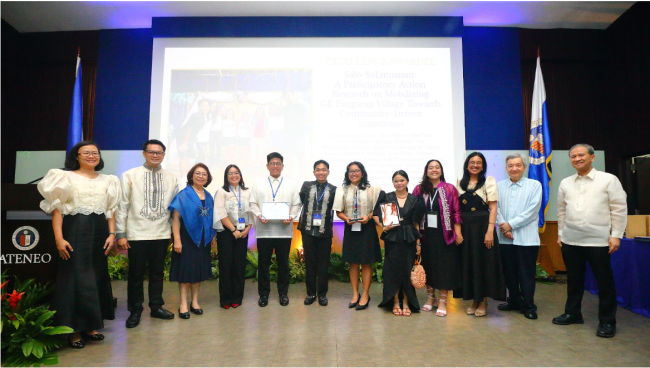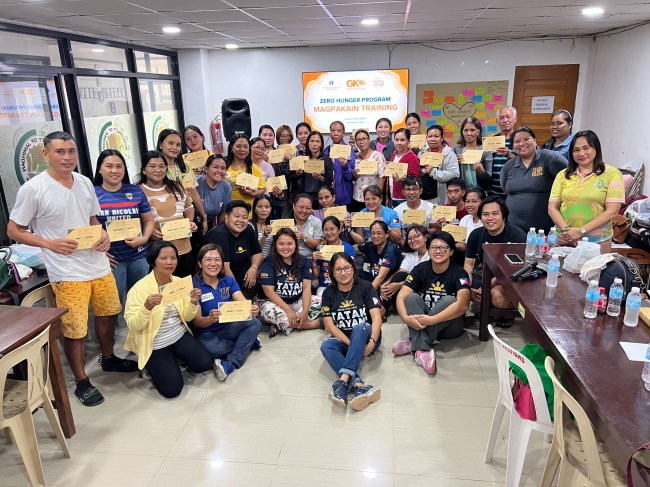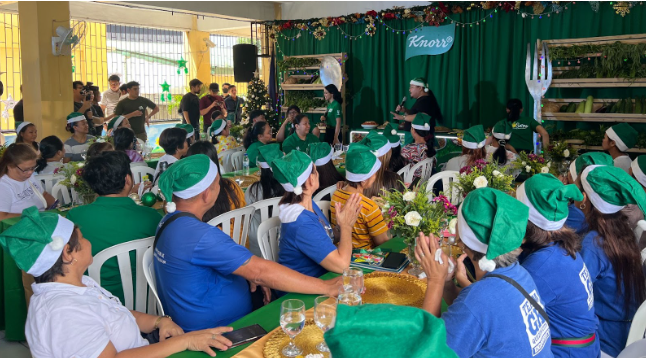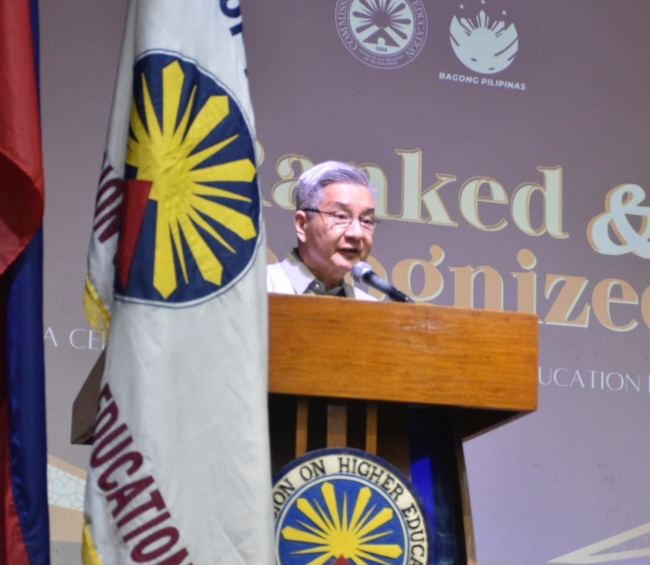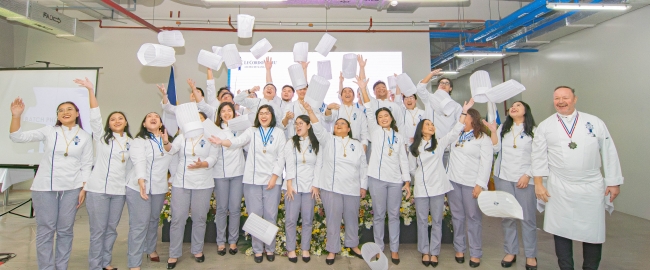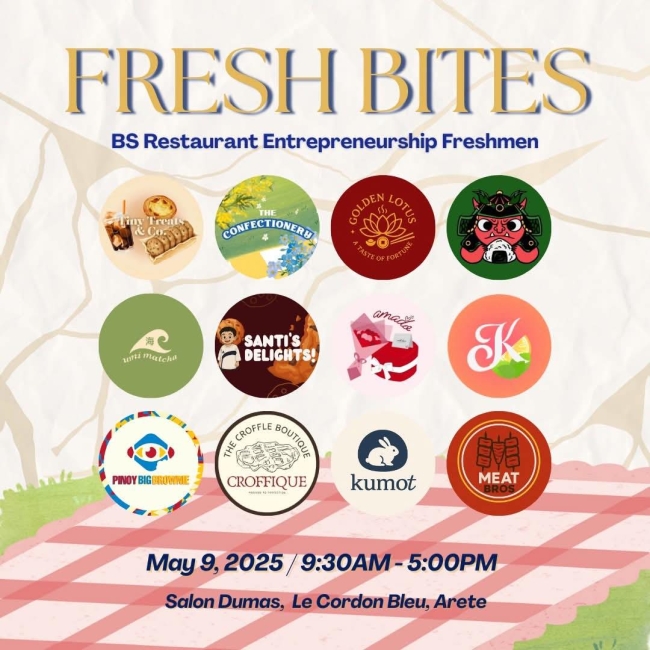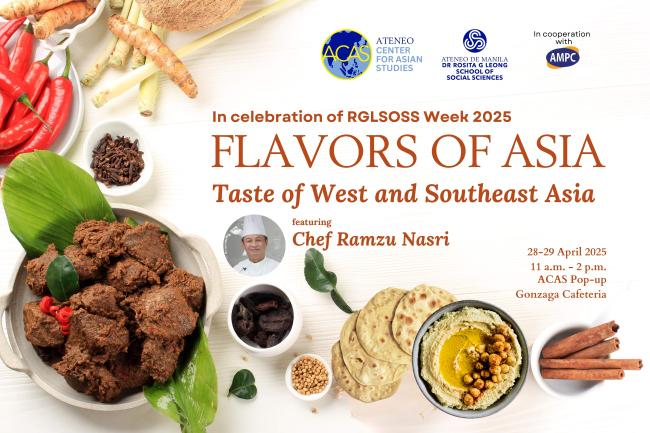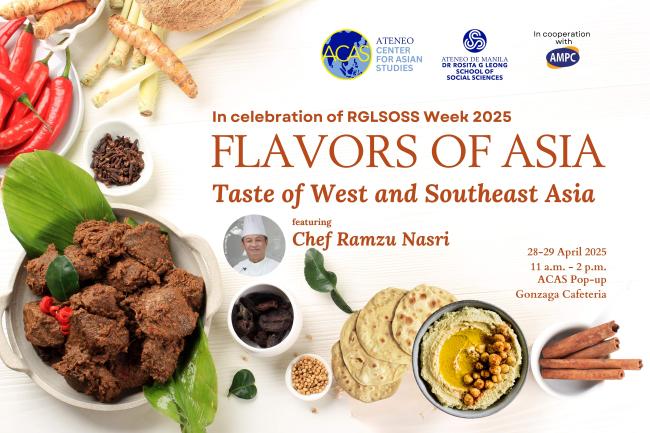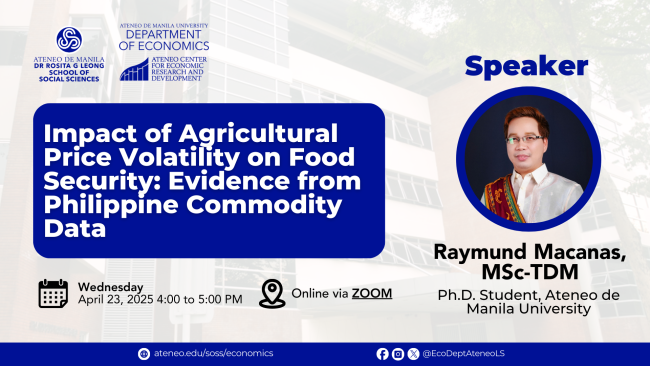Ateneo and the UN Sustainable Development Goals
Nutritious, Affordable, Sustainable: Ateneo's Commitment to Healthy Campus Dining
Ateneo provides healthy, affordable, and diverse food choices on campus through vendors like Iggy’s Food Hub, AMPC (Ateneo Multi-Purpose Cooperative), and Ebai’s Café & Pastry, Kitchen City, Macroasia, and TGS Cafeteria.
These food outlets offer a range of affordable options, which include Filipino dishes such as Nilaga and Sinigang, as well as international favorites like Pork with Mashed Potato, Steaks, Indian Samosa, Korean BBQ and Beef Bulgogi.
These cafeterias offer students and staff with budget-friendly food options, with prices that range between Php 70 and Php 130, and vegetarian options starting at Php 60 to address various dietary needs.
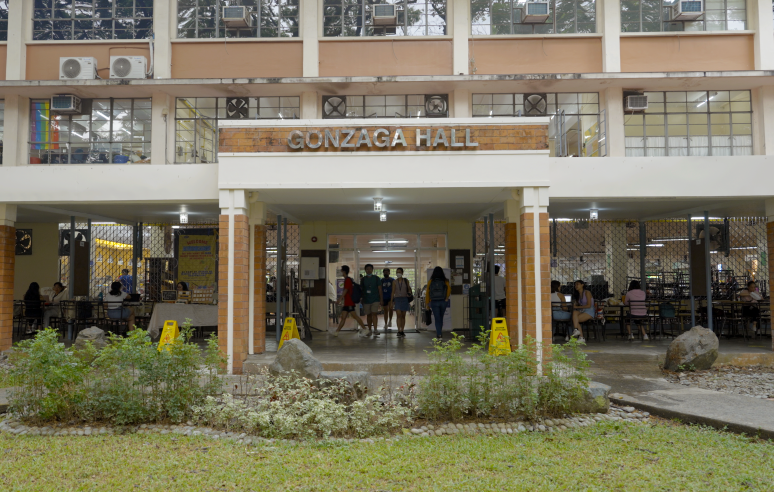
Ateneo dining practices are informed by the sustainability guidelines, offering discounts to those who bring reusable containers. AMPC, for example, offers a Php 5.00 discount on food purchases of Php 120 or more when customers use their own containers, tumblers or reusable liquid containers. A Coffee beverage stall in the AMPC cafeteria also offers locally sourced coffee beans from Benguet promoting local produce consumption and the taste of Benguet-grown coffee in every cup that they sell.
Iggy's Talipapa (flea market), a market nestled within the campus grounds, showcases an abundant selection of fresh produce harvested by local farmers. Making seasonal fruits, from ripe mangoes to juicy papayas, alongside an enticing assortment of vegetables that highlight the region's agricultural bounty accessible to everyone on the campus. You can also find essential staple items like locally milled rice and locally farm-fresh eggs. By fostering partnerships with local farmers, Iggy's Talipapa effectively connects the agricultural community with the university community, creating a lively marketplace where fresh, high-quality produce is readily available right on campus.
Iggy's Talipapa Brings Local Fruits and Vegetables to the Ateneo Community
Iggy's Talipapa is a small but important endeavor that connects students, faculty, and staff at Ateneo de Manila University with farmers in Luzon. It is a makeshift "palengke" (market) that brings fresh veggies from the farm to the community.
Iggy's Talipapa, run by the Tanging Yaman Foundation, a nonprofit known for its service-oriented mission, is more than just a pop-up vegetable market. It is a very important link between farmers in North and Central Luzon and the people who live in Metro Manila. Most of the harvests go to parishes and feeding organizations all across the city, which helps fight hunger and food insecurity. If it doesn't get to the centers, it goes to campus, where it is sold at fair prices or used to make cheap meals at Iggy's Canteen.
But this program does more than just give out food; it also shows how important it is for people to have a job, respect, and authority in their communities. The canteen and the talipapa are both very important for helping the farmers who grow the food and giving people in the Tanging Yaman Foundation's partner areas jobs that will last.
Ateneo Incorporates Tight Food Waste Tracking Procedures for a Sustainable Future
By implementing a new food waste monitoring strategy, the Office for Food Safety and Quality Assurance (OFSQA) at Ateneo de Manila University has substantially contributed to promoting sustainability. As part of the university's larger commitment to environmental stewardship, all food business operators (FBOs) on campus, including contracted providers, must begin tracking and reporting food waste systematically on September 1, 2022.
Food Sustainability Policy
The policy is in keeping with the university's 2016 Sustainability Policies and Specific Guidelines, which strongly emphasize the necessity of Information, Education, and Communication (IEC) initiatives to increase public understanding of transportation and food production’s effects on the environment. These standards reinforce the university’s continuous efforts to lessen its carbon footprint, which is the basis for the new monitoring measures.
Food Waste Monitoring Logs, Daily and Monthly
Under the new rule, FBOs must complete daily and monthly food waste monitoring logs. These logs must include the amount of food waste produced in the kitchen and eating areas, the rationale for disposal, and the staff members in charge of waste management supervision. This information is essential for spotting trends in food waste and creating mitigation plans.
The completed logs must be turned in to the University Business Affairs Office (UBAO) and the OFSQA after each month and presented during monthly Food Safety Audits. This stringent procedure supports the university’s overarching objectives of sustainability and conscientious resource management by ensuring that food waste is regularly tracked and dealt with.
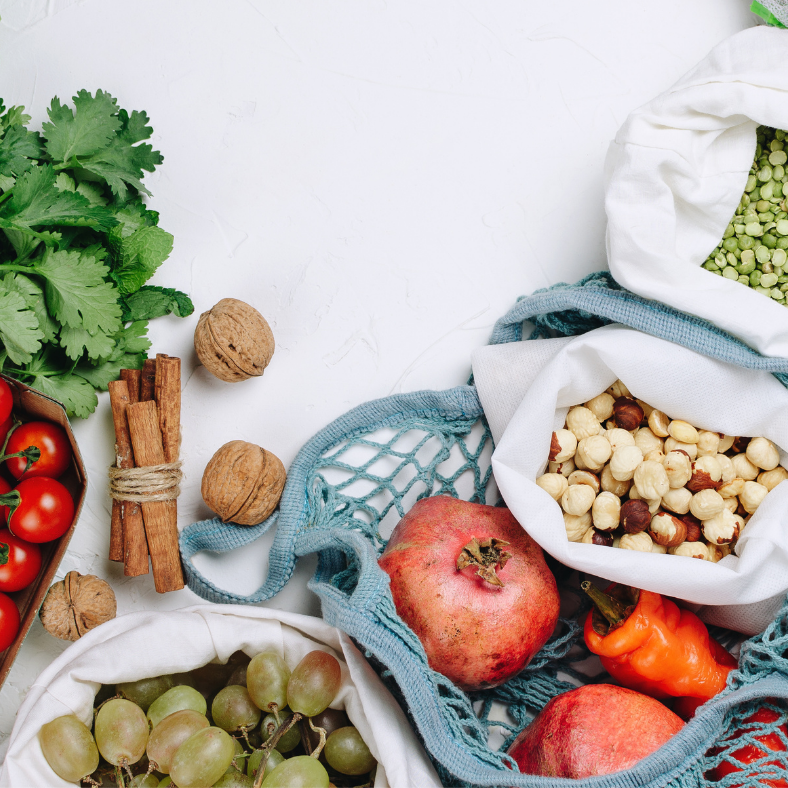
A Request for Action
The OFSQA stressed the university community’s duty to protect the environment in the August 29, 2022 document. "As persons for and with others, let us be reminded to express our care for nature by reducing food waste and supporting a culture of sustainability in all facets of our university and personal life," the note read.
The OFSQA's directive, which encourages everyone in the community to contribute to environmental sustainability, embodies the Jesuit principle of ecological stewardship.
The Hidden Cost: The Economic and Environmental Impact of Food Waste Across Ateneo’s Food Establishments
The data shows the significant impacts that food waste has on the economy and environment over one year for a range of establishments' food waste statistics.
Overview of Food Waste Data
Some 10,477 kg of food waste was generated between June 2023 and May 2024 in six different establishments: AMC, Ebai's, Kraven's, Kitchen City AGS, Kitchen City AJHS, and MacroAsia ASHS. The monthly breakdown shows variations, with September 2023 recording the most trash (1,248 kg) and December 2023 recording the least (412 kg).
Monthly Waste Statistics
- June 2023: 1,169 kg
- July 2023: 968 kg
- August 2023: 948 kg
- September 2023: 1,248 kg
- October 2023: 1,062 kg
- November 2023: 600 kg
- December 2023: 412 kg
- January 2024: 603 kg
- February 2024: 933 kg
- March 2024: 933 kg
- April 2024: 1,060 kg
- May 2024: 541 kg average
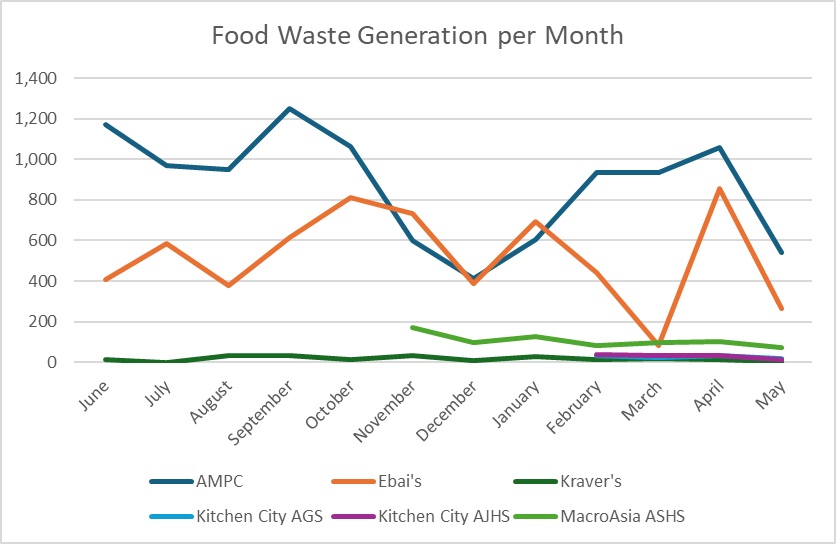
Food Waste Analysis
Notable is each establishment's average monthly food waste:
- AMPC: 873 kg
- Ebai's: 521 kg
- Kraver's: 19 kg
- Kitchen City AGS: 9 kg
- Kitchen City AJHS: 10 kg
- MacroAsia ASHS: 63 kg
According to this data, Kitchen City AJHS, Kraven’s, and AGS all maintain comparatively low waste levels, whereas AMPC and Ebai's are the biggest food waste producers.
Food Waste's Economic Impact
Food waste has substantial financial ramifications. The following are the monthly costs associated with food waste, at a cost of 60 pesos/kg:
- AMPC: 52,385 pesos
- Ebai's: 31,245 pesos
- Kraver's: 1,145 pesos
- Kitchen City AGS: 565 pesos
- Kitchen City AJHS: 580 pesos
- MacroAsia ASHS: 3,765 pesos
The annual cost of food waste for AMPC alone at these establishments comes to 628,620 pesos, underscoring the pressing need for efficient waste management techniques.
The figures highlight how important it is to address food waste in these establishments. 10,477 kg of food was wasted throughout the year, indicating a glaring need for better waste management procedures. Reducing greenhouse gas emissions from food waste helps the environment and improves economic efficiency by cutting the expenses associated with wasted food. Putting waste reduction techniques into practice can result in substantial savings and a more sustainable business.
News and Features
Fire stove project of DS majors receives 2025 ASCEND Excellence Award
This year’s ASCEND Excellence Award for College Coursework Research was awarded to Team Kaibanan sa Kalambuan, composed of Christine Noelle Choo, Glenn Derwin Dela Torre...
Nourishing the mission, strengthening community: GKA conducts magpakain training in Jamindan, Capiz
Last 15-16 August 2024, Gawad Kalinga–Ateneo (GKA) conducted a two-day Magpakain Training in Jamindan, Capiz to strengthen the local implementation of the Kusina ng Kalinga...
Cooking up hope: GK-Ateneo, Knorr Philippines and Ninong Ry bring nutrition and joy to GK Payatas Trese
In line with Ateneo de Manila University’s commitment to integral human development and Gawad Kalinga’s Zero Hunger agenda, GK-Ateneo continues to advance its mission through...
Philippine higher education: Beyond rankings, rethinking relevance
On Tuesday, 24 June 2025, the Commission on Higher Education (CHED) Chairperson Dr Shirley Agrupis hosted a celebratory dinner for the presidents and rectors of...
Le Cordon Bleu Ateneo de Manila Institute sends off 4th batch of BS REnt JGSOM graduates
On Monday, 23 June 2025, Le Cordon Bleu Ateneo de Manila Institute held its Degree Recognition Program for its fourth batch of graduates, the Class...
Ateneo Socio-Civic Engagement for National Development Excellence Awardees for SY 2024-2025 (OVPMI Memo)
23 June 2025 TO: The University Community FROM: (Sgd) Benjamin Gerardo T Tolosa Jr PhD Vice President for Mission Integration SUBJECT: Ateneo Socio-Civic Engagement for...
Pagination
Events
Fair / Festival
FRESH BITES
Fri, 09 May 2025
Salon Dumas, Le Cordon Bleu, Areté
Welcome to *FRESH BITES* 🌸🧺 — a vibrant fusion of...
Fair / Festival
Flavors of Asia: Taste of West and Southeast Asia at RGLSOSS Week 2025
Mon, 28 Apr 2025
Gonzaga Cafeteria
Fair / Festival
Flavors of Asia: Taste of West and Southeast Asia at RGLSOSS Week 2025
Mon, 28 Apr 2025
Gonzaga Cafeteria, Ateneo de Manila University Loyola Heights Campus
Workshop / Seminar / Short Course
Impact of Agricultural Price Volatility on Food Security: Evidence from Philippine Commodity Data
Wed, 23 Apr 2025
Online
